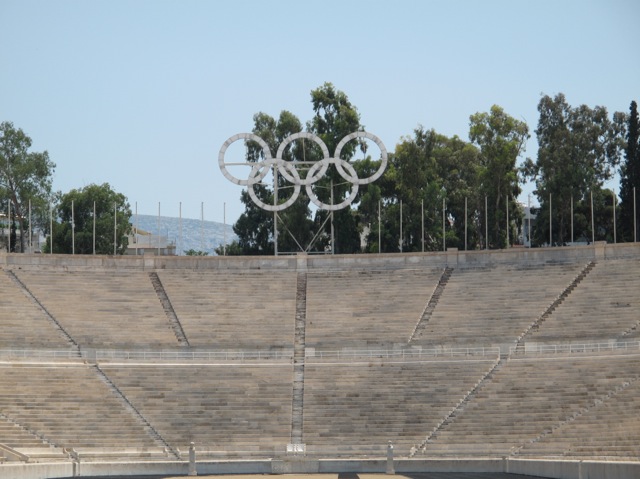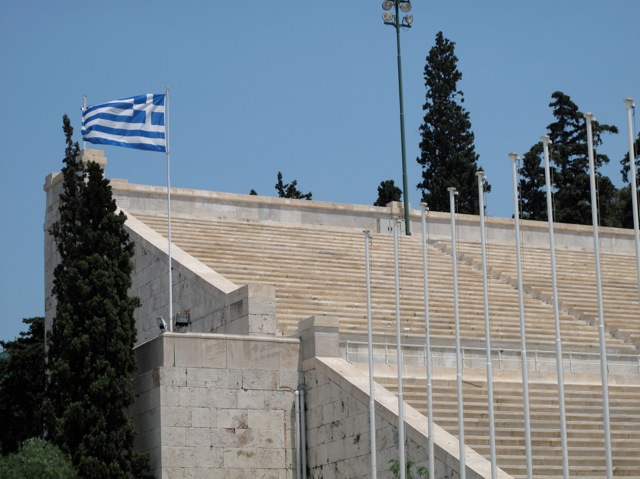

I sat in this stadium in Athens, the original Olympic theater of the ancient Greeks, and let the magic of the Games waft over me a couple of years ago.
And it is magic that millions of us feel as we witness the best in the world bring their chiseled bodies, their brimming hearts to one grand city every four years and make a collective art out of chasing Olympic glory.
In ancient times, all wars around the world came to an abrupt hiatus for the duration of the revered Games. If only that were still the case. Nevertheless, it does seem that most of us drop life as normal to immerse ourselves in the many moments of drama.
We don't need detailed explanations of each sport. We don't know how each is scored. Yet over the stretch of one day's events, we sit enthralled with the elegant, dashing thrusts of the fencers, the rabbit-like whipping strokes of the badminton players, the colorful peleton of cyclists circling Buckingham Palace. We don't need to be told what the broad-shouldered swimmers have been doing over the past decade. Their smooth muscles bulge with the evidence of their focus and discipline.
But it's the desire -- the will to perform at the highest peak -- that captures us. To watch Michael Phelps in his first event in London was to empathize with his broken heart.
This larger-than-life champion, barely human to us in his superiority over all these years, seemed a young boy, confused and on the verge of tears, even tender in his discomfort with finishing out of the medals, a position with which he simply has no familiarity.
He barely qualified for the final 8 of the 400 Meter Individual Medley. Just made it into Lane 8 by a fingertip.
To see him behind Lane 8, the lane virtually designated for that lone swimmer who doesn't really belong with the medal chasers, was in itself poignant. Michael looked scared, even somehow small in stature, in this unknown outside territory.
Then he struggled throughout the race. No matter if you were rooting for him... or his rival Ryan Lochte... you wanted a champion to show his champion stuff. Yet Michael wasn't powering his usual magnificence up and down the pool. He was lower in the water. He looked tired.
As Ryan Lochte found his peak, literally zooming to his gold medal, and the announcers kept saying that any medal, of any color, would bring Michael closer to the most ever won by any Olympian... Michael held on by a thread for that 3rd place bronze but, alas, came in 4th.
The drama was palpable. And to watch him in his post-race interview tugged at the heart strings. He tried so very hard to be noble, to turn to his next race and forget about this "tragedy." But his pain was all too evident.
It's not that we the fans have any judgment of this athlete's finish position. We are moved by the effort. And Michael's effort was supreme. But the crisis of his emotional struggle was heart-rending.
My dear friend, the late great Olympic documentary filmmaker Bud Greenspan, forged his brilliant career at the London Olympics, the Games of 1948.
Bud was a young cub reporter, writing for a New York newspaper. He sent a telegram from London to his NY editor, telling him he wasn't going to the men's 100-meter dash the next day because it was just too competitive to get anywhere close enough for an interview with the winner. He had heard of a moving story over at pistol shooting so he was going there instead.
The editor wrote him back: "You don't cover the 100 meters. You're fired."

Two mornings later, the editor came to his breakfast table where his wife was crying over the morning paper. He asked her what was moving her to tears. She said this story about a Hungarian pistol shooter who had won the gold medal in 1936 with his right hand, had lost that arm during the war and now came back to win, highly improbably, with his left hand... and many of his army buddies were at the site of his new victory and they all wept as the Hungarian national anthem rang across the shooting venue.
The editor got a note out to Bud immediately: "Get me more of those pistol shooting stories."
The Olympic Games set a stage for spectacular theater. And even for those of us not in London, we are privy to front-row seats.